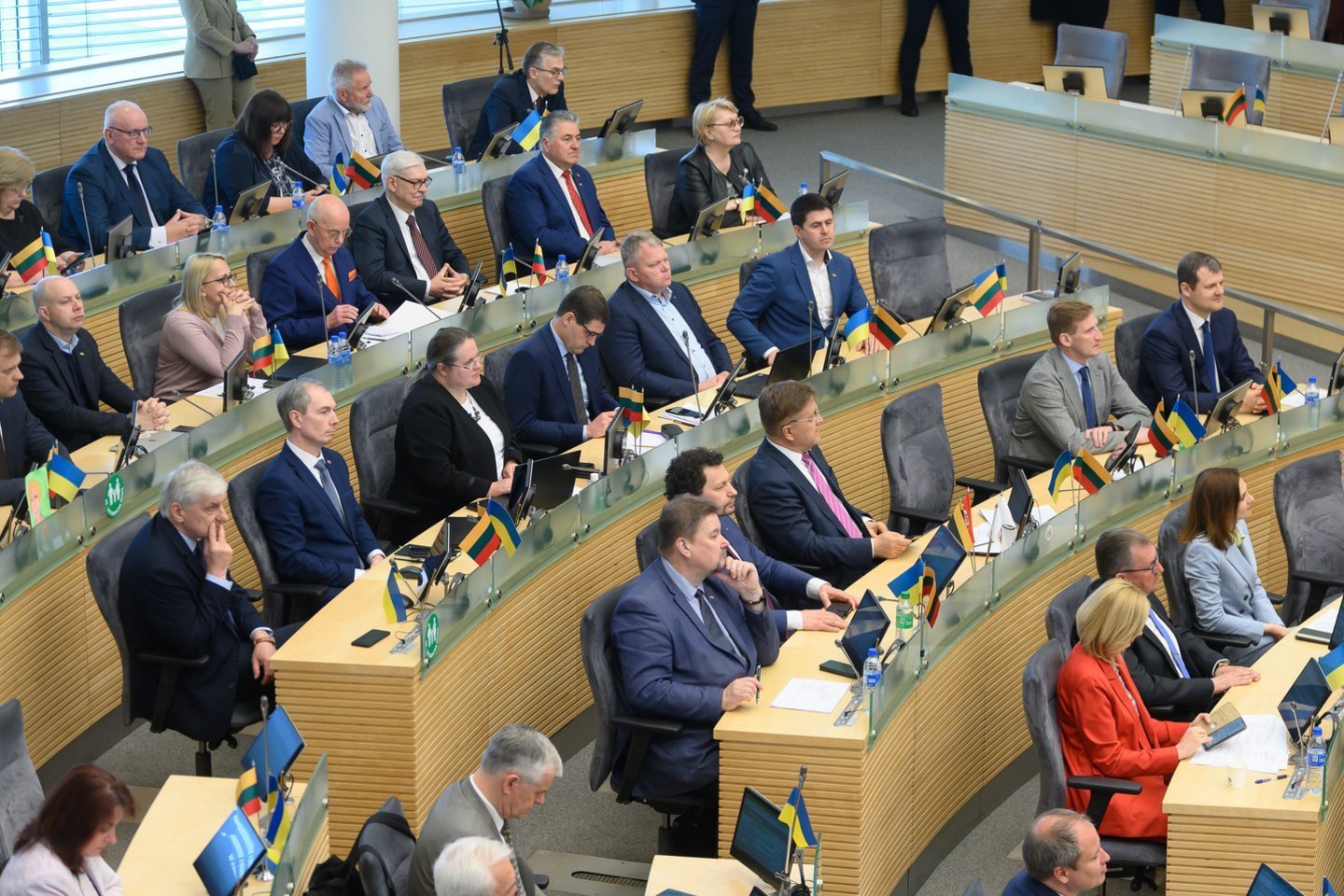On Tuesday, the opposition Peasants were once again in the spotlight when Dainius Gaižauskas, a member of the group, issued an ultimatum to the ruling parties on behalf of the party – if the laws on partnership and recognition of Vytautas Landsbergis as head of state are adopted, then LVŽS will withdraw from the joint agreements on defence and foreign policy being prepared between the parties.
„We are practically in the middle of a party agreement on defence and national security and another agreement on common foreign policy. The LVŽS group declares officially: if these bills are adopted, we will leave these agreements because LVŽS no longer sees sense in signing something with someone, especially those who are terrorising the Seimas from within and who do not really comply with the agreements,“ Gaižauskas warned.
According to him, the ruling party does not respect the agreement not to submit and discuss bills that are against the public during the war. He pointed to the recognition of Landsberg as Head of State and the legalisation of partnership as such.
On the edge of a barrier
Vytautas Dumbliauskas, a political scientist at Mykolas Romeris University (MRU), said that the Peasants' threat to withdraw from the parties' defence agreements if bills they do not like get passed is a desperate step that does not look serious.
„This is desperation because the polls show that the Peasants are slipping further – they are becoming unfashionable, like unfashionable clothes. They were fashionable in 2016, stayed in power and split. I would say that the peasants are falling into a pit, and what we are seeing now is their desperation – it is an attempt to attract attention. It is obvious that they are finished,“ V.Dumbliauskas told lrytas.lt.
The political analyst said that he seriously thinks that the Peasants' Party may not break the 5% electoral barrier in the next Seimas elections, which, according to him, is also indicated by the mass defection of LVŽS chapters in the districts to the party „In the name of Lithuania“, founded by Saul Skvernelis.
„The elections are still two years away. It is unlikely that they will get 5% because Skvernelis will still take a lot of their voters – Skvernelis is „on the wave“, and the fashion is not in the peasants' favour.
The peasants have their electorate, but will it be enough to cross the 5% threshold? Anything can happen, but the trend shows that they are going down“, the political analyst noted.
Will the label of defenders of traditional values help?
Dumbliauskas does not believe that the Peasants' attempt to distinguish themselves from the other opposition groups by fiercely opposing any form of legalisation of partnership projects will win them much more voter sympathy.
„Nothing good will come of this because sooner or later, the partnership law will be adopted in some form. The institution of marriage is, for some reason declining in importance – people don't get married, but they live together, have children, and take out loans. Then there is the importance of partnership, and it is imperative to regulate relationships – you cannot go against the wind. Society is changing.
Because partnership is not only for homosexual people – it would also regulate heterosexual relationships,“ he noted.
At the same time, he said that the opposition would benefit more from the sharp criticism of Landsberg's reintroduction to the Seimas agenda because their voices are not heard much on other topics.
„The opposition can use this issue to promote itself, to draw attention to itself. It is a political game where criticism of the issue can be used to promote oneself“, he stressed.
He got a platform
Mindaugas Lapinskas, a communications expert, thinks that it is not only the Peasants who are using the issue of Landsberg's recognition as head of state to win voters' support.
„The conservatives want to consolidate their electorate by saying that Landsberg is entitled to such a status, while the opposition – the peasants, who do not have much to offer, for them it is like a red rag – they are dancing, knowing that a lot of people in Lithuania do not like Landsberg. And it doesn't matter whether Landsberg has such status or not – it is just a way to talk to his electorate,“ Lapinskas told Lietuvos rytas TV.
According to him, the Conservative Party is characterised by this kind of behaviour – they „dig forward“ without looking at the obstacles, and sometimes this strategy works, sometimes not so well. In this case, according to Lapinskas, putting Landsberg's status back on the agenda is more to the opposition's advantage.
„The opposition benefits from this game because they generally have nothing to say about the most pressing issues. It is a way to show off, to get a platform and pretend that they are active.
There are plenty of other problems in Lithuania – price rises, security, but when there is nothing to say there, it is very easy to talk about Landsbergis or the partnership,“ the communication expert noted.
„The Conservative electorate is already quite consolidated and not small – with or without this issue, the percentage of Conservative support will not change.
But the party of Gaižauskas, which is going down poll after poll, needs to grasp at some straw and once again radicalise itself to get a platform. Here is an opportunity to say something sensible because there are no ideas in other spheres“, he added.
However, Lapinskas does not rule out that such tactics of the Peasants could turn against them.
„It could be another land grab with a shovel to the peasants' grave. To link Landsberg's recognition as head of state with a topic that is really important to everyone is childish and capricious.
Even people who are not too involved in politics probably understand that national defence is not worth joking about. As a rule, when politicians are more concerned with their own ambitions, sympathies and antipathies, the electorate does not like it very much. The Peasants will not add any pluses to themselves with such threats,“ Lapinskas is convinced.
„But I am not sure that they will pull out of the agreement. It is probably a kind of posture that if you repeat many times but do not do it, sooner or later they will stop paying attention to you too“, he added.
Just a smokescreen?
However, the communications expert also said that he did not understand why the conservatives were raising the issue of Landsberg's status now.
„Why it needs to be raised is hard to say. Maybe someone suggests it, and others don't dare to object. The issue does not change much, but if you inflame passions, it may be good unless you have other programmes from which you want to divert attention with this attempt.
It is possible that the conservatives or the government are currently adopting something very important that would fundamentally change the structure of Lithuania's political and economic life, and this issue is just a smokescreen,“ Lapinskas said.
At the same time, the future of the Peasant Party, according to Lapinskas, looks rather bleak.
„It is unlikely that these are the people who would be able to change and adapt their strategy. Their support is melting away, and they don't seem to be trying to change their way of speaking or experiment in any way.
On the other hand, we know what peasants in the 19th century used to do when there was a crop failure year after year – they heard somewhere that maybe the potatoes would come up again in the eighth year.
The peasants are following a similar tactic. We can only advise them – turn to the leader, apply more fertiliser, maybe then the ratings will improve“, Lapinskas joked.

